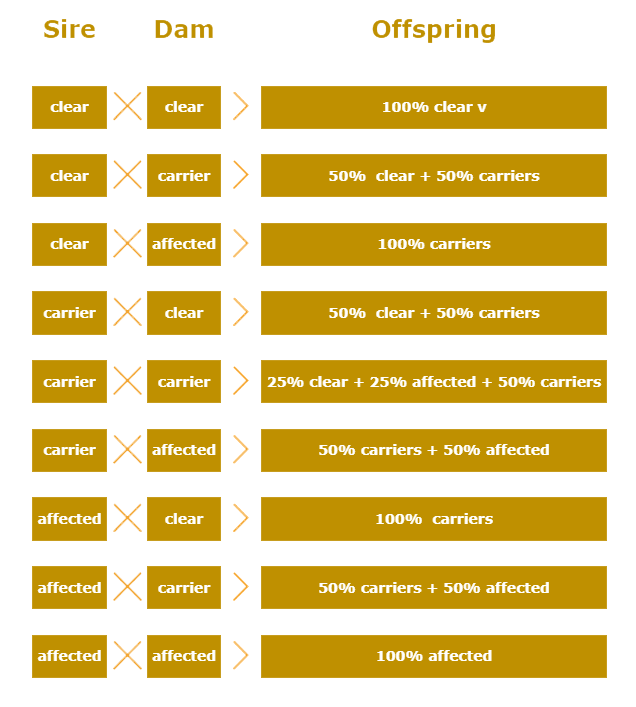
Genetic Health Tests Explained
HCM (Hypertrophic cardiomyopathy)
Hypertrophic cardiomyopathy (HCM) is a clinically heterogeneous myocardial disease and is the most common cardiac disease identified in domestic cats.
HCM is characterised by an increased left ventricular mass due to an increase in wall thickness of the heart, with papillary muscle hypertrophy and systolic anterior motion of the Mitral valves.
Subsequently, hypertrophy of the left heart chamber results in cardiac weakness and ultimately in heart failure.
Death by HCM can occur via three mechanisms:
(i) sudden cardiac death with arrhythmia and ventricular fibrillation,
(ii) heart failure with tachycardia, increased respiration, shortness of breath, pulmonary oedema and pleural effusion or
(iii) thrombus formation. Thrombi can form either in the left atrium due to abnormal blood circulation or in the heart chamber itself due to severe hypertrophy and cardiac weakness.
Atrial thrombi can break free and reach the arterial blood circuit, thereby often causing blood congestion at the branching of pelvic and crural arteries with paralysis of the hind legs. Echocardiographic examination has so far been the only diagnostic tool for this disease. However, it can only identify affected cats with some years of age, when they already present first symptoms of HCM.
Trait of inheritance
HCM is inherited as a single autosomal dominant condition. Heterozygous animals show all clinical signs of disease and can not live normal lives. They are able to propagate mutations throughout the population. Generally, 50% of a HCM positive cat’s offspring will inherit HCM. Homozygously affected animals for HCM show more severe clinical symptoms and will pass the defect gene onto all of their offspring.
SMA (Spinal Muscular Atrophy)
SMA is a disorder caused by death of spinal cord neurons that activate skeletal muscles of the trunk and limbs. Loss of neurons in the first few months of life leads to muscle weakness and atrophy that first becomes apparent at 3-4 months of age.
Affected kittens develop an odd gait with a sway of the hindquarters and stand with the hocks nearly touching. They may also stand with toes out in the front.
By 5-6 months of age they are too weak in the hindquarters to readily jump up on furniture and often have a clumsy landing when jumping down. The long hair Maine Coon cats may hide it, but careful feeling of the limbs will reveal reduced muscle mass.
Trait of inheritance
SMA is inherited as an autosomal recessive trait. So there are three conditions a cat can be: it can be clear or homozygous normal (genotype N/N) meaning that it does not carry the mutation and will not develop SMA. Since it also cannot pass the mutation onto its offspring, it can be mated to any other cat. A cat which has one copy of the gene with the mutation and one copy without the mutation is called a carrier or heterozygous (genotype N/SMA); while it will not be affected by SMA, it can pass the mutation onto its offspring and should therefore only be mated to clear cats.
Affected kittens have two gene copies with the mutation (genotype SMA/SMA or homozygous affected); they will always pass the mutated gene onto their offspring.

Clear
Genotype: N / N [ Homozygous normal ]
The cat is a non-carrier of the mutant gene.
It is very unlikely that the cat will develop SMA (Spinal Muscular Atrophy ). The cat will never pass the mutation to its offspring, and therefore it can be bred to any other cat.
Carrier
Genotype: N / SMA [ Heterozygous ]
The cat carries one copy of the mutant gene and one copy of the normal gene.It is very unlikely that the cat will develop SMA (Spinal Muscular Atrophy ) but since it carries the mutant gene, it can pass it on to its offspring with the probability of 50%.
Carriers should only be bred to clear cats.
Affected
Genotype: SMA / SMA [ Homozygous mutant ]
The cat carries two copies of the mutant gene and therefore it will pass the mutant gene to its entire offspring.
The cat is likely to develop SMA (Spinal Muscular Atrophy ) and will pass the mutant gene to its entire offspring
PK Deficiency (Pyruvate Kinase Deficiency)
Pyruvate kinase (PK) is an enzyme critical to the anaerobic glycolytic pathway of energy production in the erythrocyte. If erythrocytes are deficient in PK they are unable to sustain normal cell metabolism and hence are destroyed prematurely. This deficiency manifests as an hemolytic anemia of variable severity with a strong regenerative response. In cats, PK deficiency has been described in Abyssinian and Somali cats. The feline disease differs from the canine disease in that affected cats can have a normal life span, only intermittently have anaemia, and do not seem to develop either osteosclerosis or liver failure. The clinical signs of disease reflect the anaemic status of the animal and include exercise intolerance, weakness, heart murmur and splenomegaly.
Trait of inheritance
PK is inherited as an autosomal recessive condition. Heterozygotes (carriers) do not have any clinical signs of disease and live normal lives. They are able to propagate mutations throughout the population however and it is therefore important that carrier animals are detected prior to breeding. PK deficiency can be detected, using molecular genetic testing techniques. These tests identify both affected and carrier animals. It is also possible to identify animals deficient in PK activity through enzyme analysis in those breeds where a molecular genetic test is not available.

Clear
Genotype: N / N [ Homozygous normal ]
The cat is a non-carrier of the mutant gene.
It is very unlikely that the cat will develop PK Deficiency (Pyruvate Kinase Deficiency). The cat will never pass the mutation to its offspring, and therefore it can be bred to any other cat.
Carrier
Genotype: N / PK [ Heterozygous ]
The cat carries one copy of the mutant gene and one copy of the normal gene.
It is very unlikely that the cat will develop PK Deficiency (Pyruvate Kinase Deficiency) but since it carries the mutant gene, it can pass it on to its offspring with the probability of 50%.
Carriers should only be bred to clear cats.
Affected
Genotype: PK / PK [ Homozygous mutant ]
The cat carries two copies of the mutant gene and therefore it will pass the mutant gene to its entire offspring.
The cat is likely to develop PK Deficiency (Pyruvate Kinase Deficiency) and will pass the mutant gene to its entire offspring
